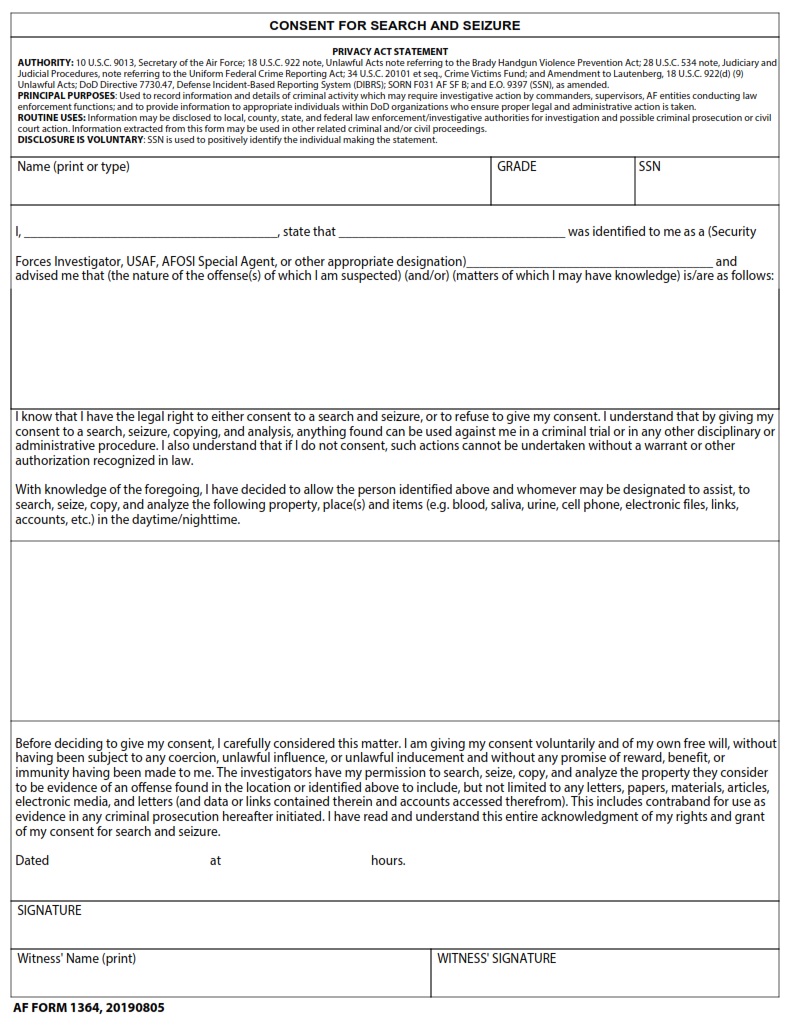AF-FORMS.COM – AF Form 1364 – Consent For Search and Seizure – Consent for search and seizure refers to the permission given by an individual or entity to allow law enforcement officers to conduct a search of their property or belongings without a warrant. It is usually obtained through a written consent form such as AF Form 1364, which outlines the specific items and areas that can be searched.
The decision to give consent for search and seizure should not be taken lightly, as it gives law enforcement officers broad authority to conduct searches without probable cause. Individuals are advised to carefully read and understand the terms of the consent form before signing it, as they may be waiving important legal rights.
It is important to note that individuals can withdraw their consent at any time during the search. However, once an item has been seized, withdrawing consent will not compel law enforcement officers to return it unless there are additional legal grounds for doing so. Ultimately, providing consent for search and seizure requires careful consideration of one’s legal rights and responsibilities in order to ensure that any searches conducted are fair and lawful.
Download AF Form 1364 – Consent For Search And Seizure
| Form Number | AF Form 1364 |
| Form Title | Consent For Search and Seizure |
| Edition Date | 8/5/2019 |
| File Size | 694 KB |
AF-Form-1364-Consent-For-Search-And-Seizure.pdf (63 downloads )
What is an AF Form 1364?
AF Form 1364 is a legal document used by the United States Air Force to obtain consent for search and seizure. This form is filled out by an individual who willingly agrees to allow law enforcement officials to conduct a search of their person, property, or vehicle. The purpose of this form is to ensure that searches are conducted in compliance with the Fourth Amendment of the United States Constitution, which protects citizens from unreasonable searches and seizures.
The AF Form 1364 requires the individual’s signature as well as the date and time of consent. It also includes a section where individuals can limit the scope of the search or revoke consent at any time during the search. In addition, it provides information about what items can be searched for and seized during a lawful search.
It’s important to note that while signing an AF Form 1364 may seem like an easy way out, individuals should always consider their rights carefully before giving up their right against unreasonable searches and seizures. In some cases, granting permission for a search might lead to unintended consequences that could have been avoided if they had consulted with legal counsel first.
Where Can I Find an AF Form 1364?
AF Form 1364 is a legal document that authorizes the search and seizure of property in accordance with military regulations. It is used by Air Force personnel to obtain consent for searches from individuals or entities subject to military jurisdiction. The form specifies the rights of the individual being searched and outlines what can and cannot be searched.
To find an AF Form 1364, you have several options. You can start by checking with your unit’s legal office or security forces squadron. They should have copies available and can assist with any questions you may have about filling it out correctly. Additionally, the form can be found online on various military websites and databases. Make sure to download a current version to ensure compliance with any recent changes in regulations.
It’s important to note that filling out an AF Form 1364 does not waive your Fourth Amendment rights against unreasonable searches and seizures. Before signing, make sure you understand what you are consenting to and consult with a legal professional if necessary.
AF Form 1364 – Consent For Search And Seizure
AF Form 1364, also known as Consent For Search And Seizure, is a legal document that allows law enforcement officers to conduct a search and seize items or evidence without a warrant. This form is often used in situations where there is probable cause to believe that illegal activity has taken place, but obtaining a warrant may result in the loss of important evidence.
The consent given on AF Form 1364 must be voluntary and informed. The individual giving consent should understand their rights and the consequences of allowing a search without a warrant. It’s essential to note that an individual can revoke their consent at any time during the search.
It’s crucial to carefully read and understand this form before signing it since it grants law enforcement officers significant power to conduct searches without proper judicial oversight. If you have any doubts about whether or not you should give consent, it’s advisable to speak with an attorney before proceeding.
AF Form 1364 Example
